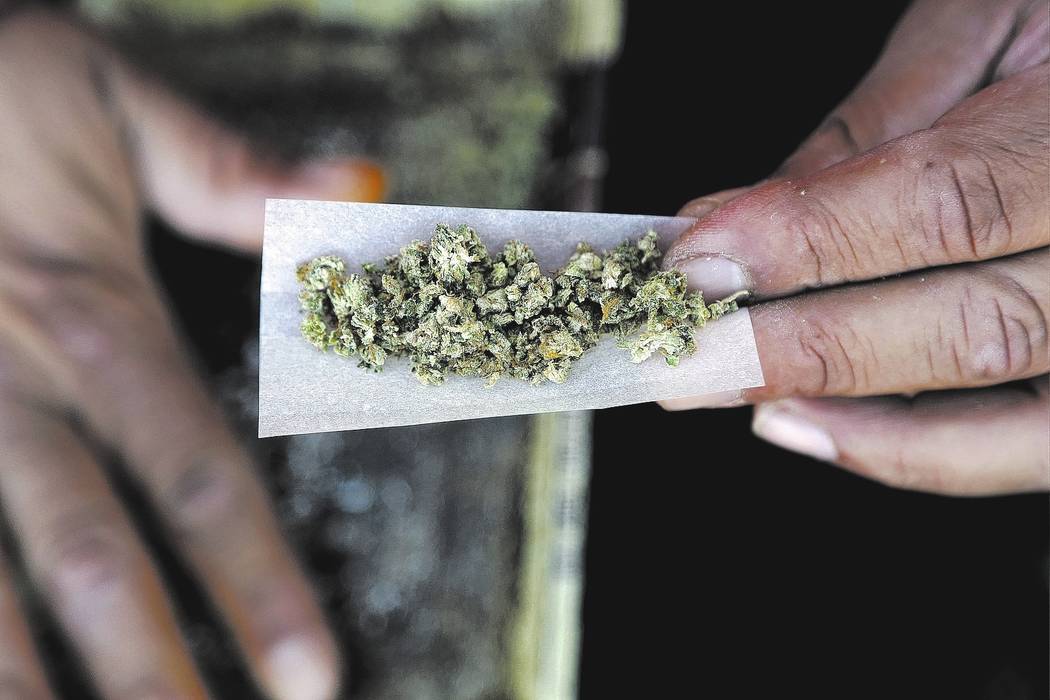COMMENTARY: Nevada needs to implement safeguards for legal pot
Recently, Nevadans have been bombarded with news about stores running out of marijuana after legal sales began at the beginning of the month.
In this so-called “state of emergency,” some reports have suggested that Nevada will sell so much weed that the state will never have to worry about tax revenue again.
But before Nevadans jump on the tax revenue bandwagon and rush to sell more marijuana, they should look at what has happened in states that previously legalized the drug, and spend more time putting safeguards into place.
In 2012, Colorado voters were told that legalizing marijuana would generate a tax windfall to fund schools and treatment programs. The pro-pot lobbyists also promised that legalization would rid Colorado of its black market, and that tight regulation would keep communities safer.
Four years later, none of these promises has held up.
Contrary to popular belief, Colorado’s budget deficit is growing, not shrinking. The state now projects it will be $700 million short in its next budget cycle. Marijuana tax revenue makes up less than 1 percent of the state’s budget. That’s hardly a windfall.
And even viewed solely in the context of Colorado’s educational needs, pot revenue is not newsworthy. The Colorado Department of Education indicates its schools now require about $18 billion — billion with a B — in capital construction funds alone. Marijuana taxes do not even make a dent in this gap.
Washington state tells a similar tale. There, half of the tax money legalization advocates promised for prevention and schools has been siphoned into the state’s general fund instead.
And despite assurances that legal marijuana would abate the black market, states such as Colorado and Oregon have seen continued, if not increased, black-market activity. Colorado’s attorney general recently stated the “black market for marijuana has not gone away since recreational marijuana was legalized in our state, and in fact continues to flourish.”
The context for that statement is even more instructive. In June, a grand jury indicted 62 people and 12 businesses for their roles in a massive Colorado-based drug trafficking ring. Allegations are that they pretended to grow marijuana for sick people using state pot licenses. And just two weeks earlier, in another case, a former marijuana enforcement officer and a pot businessperson were arrested for using Colorado pot license businesses to cover up black-market activity.
Similar issues can be seen in Oregon, where a leaked state police report revealed the state was producing significantly more marijuana than the market could consume, and that 70 percent of marijuana market activity there is illegal.
Beyond tax revenue failures and black-market activity, the realities of road safety in legalized states have also been downplayed.
Driving under the influence of marijuana has become particularly grave in states such as Washington. Last year, the AAA Foundation for Traffic Safety reported that the percentage of Washington state drivers involved in fatal crashes who recently used pot more than doubled after the state legalized the drug. It’s not just the Evergreen State, either: In Colorado, pot is now involved in more than one of every five deaths on the road, and that number is rising. Yet in Nevada, we hear very little about any campaigns to reduce marijuana-impaired driving.
It’s tempting for Nevadans to turn on the news and see dollar signs when they hear of long lines at dispensaries and empty shelves. Peel back the shiny veneer, however, and you’ll see something is rotting inside.
We should all slow down, take a deep breath, and implement safeguards against this new, money-hungry pot industry now before it is too late. Rather than rushing to get more pot out the door, decision-makers should spend more time discouraging youth marijuana use, reducing the influence of special interests and severely restricting advertising and promotion.
The truth is that in every state where it has been tried, legalization’s costs outweigh any financial benefits. Nevada shouldn’t expect anything different.
Dr. Kevin Sabet is president of Smart Approaches to Marijuana.




























